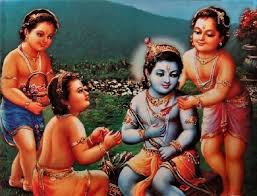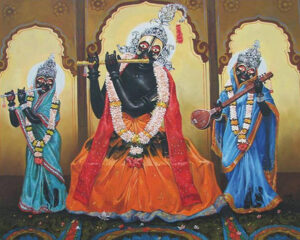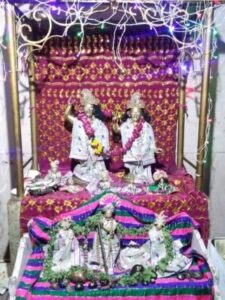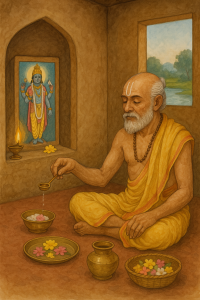This story from Shri Ayodhya ji, centered around the ashram between ‘Kanak Bhavan’ and ‘Hanumangadhi’ known as ‘Dashrath Mahal’, beautifully illustrates the deep connection between devotion, humility, and divine intervention.
Once, there was a saint named Shri Ramprasad who lived in this ashram. In those days, Ayodhya ji was not crowded, and not many people visited. Shri Ramprasad dedicated his life to serving the deity and established the ashram known as ‘Dashrath Mahal’. The temple within the ashram housed the idols of the four brothers—Shri Ram, Shri Laxman, Shri Bharat, and Shri Shatrughan ji—along with Hanuman ji. The offerings made in the temple were used to sustain the ashram and its residents, including the saints.
Every day, the offerings from the temple were sent to a local merchant named Palatu Banija. The saint had a deep connection with this merchant, as he would provide for the temple’s needs. But one day, the temple received no offerings, leaving the saints in a predicament. Shri Ramprasad sent two saints to Palatu Banija to ask for some provisions on credit. However, the merchant refused, stating that his relationship with the Mahant (head saint) was strictly cash-based, and he couldn’t offer anything on credit.
Shri Ramprasad, accepting the situation as God’s will, offered only water to the deity that day. The saints, too, drank water and went to bed hungry, enduring the test with patience. Despite their hunger, they continued their daily rituals, covering the deity with a beautiful Pitambar (yellow cloth) as they always did. Shri Ramprasad, though hungry, spent an hour each night reciting hymns to God before going to sleep.
Divine Intervention
As the night wore on, around midnight, someone knocked on the door of Palatu Banija’s home. The merchant was startled and cautiously approached the door, expecting troublemakers. But when he opened it, he saw four young boys, no older than twelve, standing there, all dressed in Pitambar. The boys carried with them the same Pitambar that had been used to cover the deity. Their presence was so divine and charming that Palatu’s anger melted away.
The boys told Palatu that they were sent by Ramprasad Baba and handed him the Pitambar, saying, “Open a corner of this cloth, and you will find sixteen hundred rupees.” In those days, sixteen hundred rupees was a significant amount of money. Palatu, in disbelief, opened the cloth and indeed found the money. The boys instructed him to send the provisions to the ashram in the morning and never to refuse a request from the saints again. They warned him that if he did, he would face great shame.
Palatu, filled with regret and awe, agreed and asked for forgiveness. The boys then left, taking the Pitambar with them.
The Revelation
The next morning, when the priest went to the temple for Mangala Aarti, he noticed that the Pitambar was missing. He informed Shri Ramprasad, who feared it had been stolen. Meanwhile, Palatu arrived at the ashram with the provisions, his hands folded in apology. Confused, Shri Ramprasad asked him what had happened, and Palatu recounted the entire incident from the previous night.
Shri Ramprasad realized that the four boys were none other than the four brothers—Shri Ram, Laxman, Bharat, and Shatrughan—who had come in disguise to help their devotees. Overcome with emotion, he rushed to the temple and fell at the feet of the deity, weeping, “Oh, Bhaktavatsal (protector of devotees), you suffered for me in the middle of the night while I served you my whole life, yet I couldn’t even recognize you when you came to help.”
Palatu Banija, too, was shocked to learn that the divine beings he had encountered were the Lord himself. From that day on, he never refused the ashram’s requests and became a devoted follower, later known as Shri Paltudas ji.
The Aftermath
The events left a profound impact on Shri Ramprasad ji. His anxiety and devotion deepened, and that night, while singing bhajans before bed, he fainted from the overwhelming experience. In his unconscious state, he had a divine vision of the four brothers, along with their wives. Shri Janki ji (Sita) wiped his tears and placed a bindi on his forehead, which he wore for the rest of his life. This bindi tilak became a tradition in their ashram.
The story illustrates the boundless compassion of the Lord, who comes to the aid of his devotees in their time of need. It reminds us that divine tests, though difficult, lead to greater understanding and deeper faith. The Lord’s intervention in the lives of the saints shows that He is always watching over His devotees, ensuring that their needs are met and their devotion rewarded.
May we all remember this lesson and approach life with the same humility, faith, and devotion as Shri Ramprasad ji and his followers.



